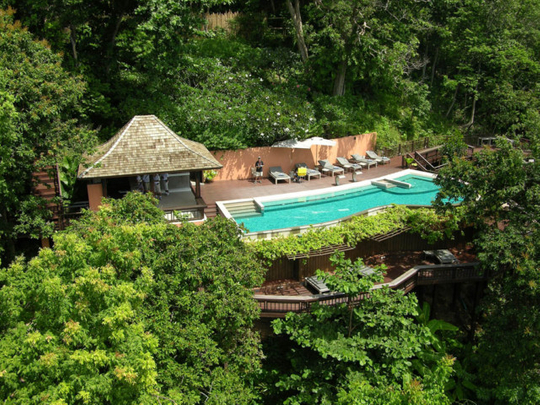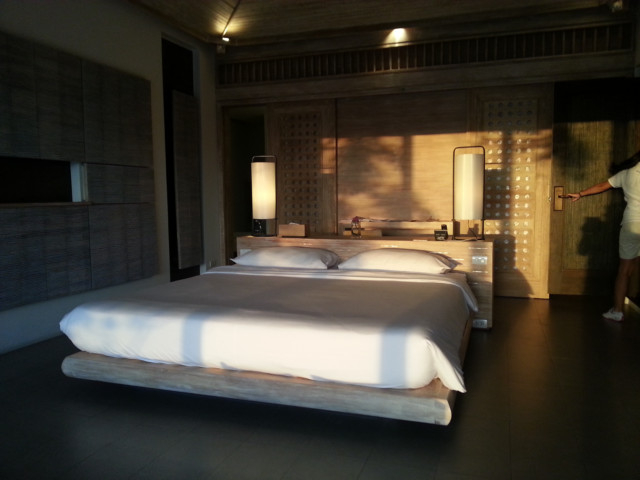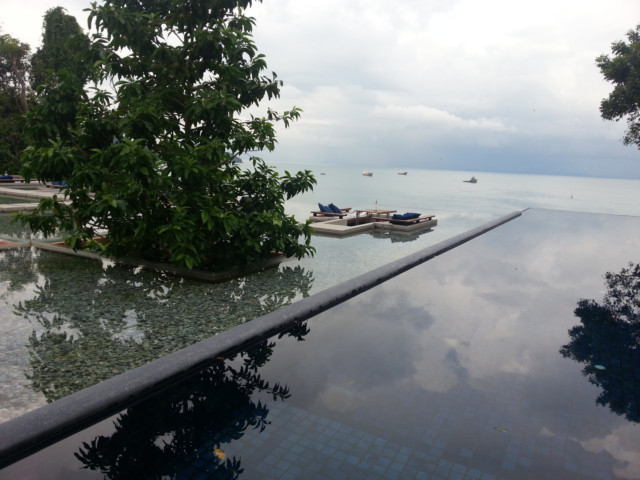
The skies darkened on Cape Panwa as the sea swallowed the December Sun. “It will rain in five minutes,” declared a man in a biscuit polo T-shirt and blue shorts as he burst on to the terrace overlooking the blue infinity swimming pool and the vast Andaman Sea.
His word came true. It poured in sheets. The man bowed apologetically for the inconvenience the rain had caused and the high winds it had conjured up. Could we move into the hall? he asked, still troubled that the rain was proving to be obstinate. “They are good for the plants though,” he said, as he pointed to the tropical jungle on the mountains that was gleaming with droplets of water.
As night fell, the tranquil Sri Panwa resort in Phuket was bathed in quiet lights. Guests spread themselves over the many restaurants that dotted the resort.
“Where do you work?” someone asked the man in shorts. “He is my boss,” whispered Sumana Vorachun ‘Air’, the resident manager of the resort. Vorasit Issara ‘Wan’, managing director of Sri Panwa, who had lived as a Buddhist monk only a few weeks ago, is almost embarrassed to be labelled the owner of one of the most luxurious resorts in the world.
“It was tough,” he said. “The life of a monk is not easy,” Wan said, his knees bearing brown bruise marks. “Oh, the bruises came because of hours of meditation on my knees. Every Buddhist man must live as a monk for some time in his life. We usually do it in our twenties. But I was too busy. So I did it a few weeks ago. I am 31,” he said. The regimen involved him getting up at 3.30am, praying, meditating and then going out into the villages to ask for food. “The fare I was given was simple, mostly chicken, rice and vegetables,” said Wan. “Then I would go back to my tiny chamber, clean it and meditate again.”
The practice of living as a monk, he said, is a token of gratitude to one’s parents. Wan spent his days as a monk at the Ampawan Temple and Wat Pah Nanachat Monastery in Thailand. His journey to his soul also took him to India, where he visited famous Buddhist sites, travelling mostly by train.
“During the journey to Nalanda and Rajgir, all the towns and villages we passed through portrayed a pathetic and depressing state of affairs — every drain overflowed with dirty black water, roadsides were littered with garbage, polythene and plastic packets. Malnourished children in dirty school dresses stared at passing vehicles with a vague look in their eyes. The sweets in the roadside motels and shops kept in the open were covered by a thick layer of fat, black flies,” Wan recalled. But he is quick to add that India, like Thailand, is a land of extremes where wealth and poverty overflow.
“I stayed with friends in Delhi. It was Diwali, quite like Christmas in the West. The festivities were over the top,” he said.
So how does a man, who was born into luxury, lived like a monk and is humble enough to serve his guests food on their plates, manage a 40-acre lush resort, replete with villas, suites and private infinity swimming pools? Teamwork, is the prompt response. Wan’s family owns a real estate business in Thailand, but he wanted to do something different. He studied business management and hotel management abroad, and when he returned home, he decided to build a resort on the mountains. He teamed up with his school friends Vorachun and Yu Po Yan ‘Suki’, the hotel manager. Jared O’Brien, the food and beverage and business development manager, is also part of the core team.
Since Wan could not bring machines to dig the mountains, it was done by hand. Trees were cut and transplanted. They were brought back when work was done. “All the trees were marked and named. We dug up 1,500 trees and put them in a nursery for replanting. If you look across the resort, the villas are almost invisible because they are covered by canopies of green. And because we are green, the properties do not need much maintenance. We don’t have to paint too much and only occasionally oil the teak,” said Wan.
The villas and suites are elegant, not opulent — simplistic in their beauty. The infinity pools are inviting, as is the sea. And the food, ranging from Thai, Japanese to Western, is a delight. The ambience drains fatigue from mind and body. You can watch the morning break through the glass walls of your room. There is personal attention to every detail.
Wan is quick to point out that at Sri Panwa, his trusted team watches over everything — from the décor to the cuisine. He is excited as he talks about the birth of the resort and the early days of hard work when he would be stationed in the kitchen. Guests have grown over the years. Celebrities escape quietly to the green environs of the resort, cut off from the chaos of daily life.
And now it is even easier to get to the retreat. Emirates airline launched a daily flight to Phuket from Dubai on December, 10 making access to the green island a breeze. European travellers too can connect to Phuket, with Emirates using the Airbus A380 on that route.
But all this luxury does come at a price. In Phuket, residents say their dream is to stay at the resort for a day. Rates do drop from mid April to October if you are watching your pocket, and the resort does give deals. It is worth the experience once in a lifetime. Spoil yourself.
FACT BOX
Fully operational since 2009 with 52 pool villas and residences, the villas at Sri Panwa sit 40-60 metres above sea level. Each pool villa is nestled within its own infinity, 1.3 metre-deep pool with a jet stream Jacuzzi system, an indoor-outdoor living area, sound system, dining space, pool deck, pantry, master bedrooms, outdoor terrazzo and soaking bathtub, a separate rain shower and sunset pavilion. Sri Panwa has a private beach and floating pier to make boat trips to nearby islands to dive or swim.
Room rates: Range from Dh3,000-11,000 (rates drop from mid April to October).
GETTING THERE
Return ticket prices: Economy class: Dh3,050; Business class: Dh7,120. Daily flights depart Dubai at 12.45pm to arrive in Phuket at 9.55pm and depart 12.35am to arrive in Dubai at 4.35am.
Thailand is three hours ahead of Dubai.
PHUKET AND KRABI
If you like tropical green, the sea and great food, Phuket and the adjoining island of Krabi must be your destinations. Getting there is easy with Emirates launching a daily flight to Phuket from Dubai. Flying time is just six hours. There are plenty of resorts and hotels that will suit your budget. In Phuket, one green resort is the Indigo Pearl. You can enjoy a tropical rainforest with modern conveniences. There is a lot to do and see in Phuket. Old Architecture sits next to a busy nightlife, and shopping is good too. The Patong area is dotted with hotels such as the La Flora which has private swimming pools attached to rooms. A boat ride to Phi Phi island is a must, the rich green waters are teeming with fish — great to dive or snorkel. You can go to Krabi from Phuket by car or drop anchor in Krabi Island where the sprawling Sheraton Krabi will repair your limbs after a long swim or dive. The service and food are excellent. But Krabi’s secret lies in a hill-top restaurant called the Lay Lae, which serves Thai delicacies along with the staples. You can also go elephant riding or go for a swim to the Emerald pool, a fresh water lake fed by water from the mountains. The people of Phuket and Krabi are polite, friendly and helpful. Little wonder Thailand is called the land of smiles. And both Phuket and Krabi will win your heart.




